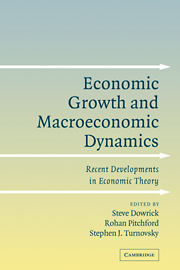Book contents
- Frontmatter
- Contents
- Preface
- Contributors
- PART ONE TOPICS IN GROWTH THEORY
- 1 Growth and the Elasticity of Factor Substitution
- 2 Relative Wealth, Catching Up, and Economic Growth
- 3 Knowledge and Development: A Schumpeterian Approach
- PART TWO STATISTICAL ISSUES IN GROWTH AND DYNAMICS
- PART THREE DYNAMIC ISSUES IN INTERNATIONAL ECONOMICS
- Index
2 - Relative Wealth, Catching Up, and Economic Growth
Published online by Cambridge University Press: 31 October 2009
- Frontmatter
- Contents
- Preface
- Contributors
- PART ONE TOPICS IN GROWTH THEORY
- 1 Growth and the Elasticity of Factor Substitution
- 2 Relative Wealth, Catching Up, and Economic Growth
- 3 Knowledge and Development: A Schumpeterian Approach
- PART TWO STATISTICAL ISSUES IN GROWTH AND DYNAMICS
- PART THREE DYNAMIC ISSUES IN INTERNATIONAL ECONOMICS
- Index
Summary
We show that, by including relative wealth in the reduced-form utility function, a number of phenomena can be explained, such as differences in growth rates among nations and the catching up achieved by some poor countries, in a world where initial wealths are not equally distributed. We give sufficient conditions for the final distribution of wealth to be independent of the initial distribution, and conditions for saddlepoint stability in a two-class model. The question of catching up was studied by Stiglitz (1969) under the assumption that individuals do not save optimally. Stiglitz showed that if all individuals save a constant fraction of their income, then eventually the poor will catch up with the rich. Kemp and Shimomura (1992) demonstrated that catching up will not occur if individuals save optimally (and care only about their consumption). In this chapter, we show that if individuals care enough about their relative wealth, then catching up will take place under optimal saving.
INTRODUCTION
Why do countries grow at different rates? Economists have offered a variety of explanations. One of these is the difference in saving rates. Countries that save a higher fraction of their income accumulate capital faster; this results in higher growth rates of income (at least in the short run). But why do saving rates differ across countries? One possible explanation is that utility discount rates may differ, even if the instantaneous utility functions may be identical. An alternative explanation is that an individual's utility may be a function of several variables, one of which is relative wealth. An individual's concern about his relative position in society may have an influence on his saving behavior.
- Type
- Chapter
- Information
- Economic Growth and Macroeconomic DynamicsRecent Developments in Economic Theory, pp. 18 - 45Publisher: Cambridge University PressPrint publication year: 2004



